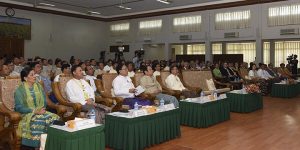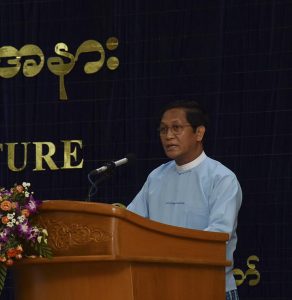17 October
Myanmar’s Union Government commemorated World Food Day with an exhibition at the Ministry of Agriculture, Livestock and Irrigation in Nay Pyi Taw yesterday.

Vice President U Henry Van Thio delivered the opening speech at the ceremony, which was attended by union ministers, the Union Attorney-General, deputy ministers, MPs from the Pyidaungsu Hluttaw, Nay Pyi Taw Council members, foreign ambassadors, representatives from UN Food and Agriculture Organization (FAO), its related agencies, INGOs and NGOs, and department officials.
VP’s speech
In his speech, the Vice President first said it is an honor to deliver the address at the World Food Day event, which is held annually on 16 October. He said the FAO designates themes each year, which aim for food security and bringing an end to hunger, and this year’s theme is “Our Actions Are Our Future, Healthy Diets for A Zero Hunger World”.
While the world has been working hard to meet those two goals in the past decade, there has been no significant results and the malnourished population continues to rise, said the Vice President. FAO states there are over 800 million people in that demographic, meaning one in nine people are underfed and starving. This is caused not only by insufficient production, but also by a lack of quality edible food.
The Vice President said unhealthy food is the main cause of diseases and deaths in the world and this is the reason we need to quickly implement sustainable production of healthy food for every person.
Newer tech brings ups & downs
Technological advancements are changing the way people live, behave and make dietary decisions and more people are choosing to consume calorie-rice GMOs and meat over seasonal crops, fruits and food containing fibre, said the Vice President. He said the global dietary trend in urban districts is to eat ready-made food purchased from 24-hour marts and restaurants.
He said climate change and the onset of increasing natural disasters are damaging agricultural businesses in rural districts, which causes their income to be insufficient to purchase fresh meat and nutrient-rich food. This also affects the production rate of agricultural and livestock products, said the Vice President.
According to the FAO, humans used to cultivate over 6,000 varieties of crops as food but now only nine varieties are being cultivated to meet 66 per cent of the global crop production in modern times. Efforts are made to boost the production of wheat, maize and rice, the three main crops aimed to fulfill 50% of the global energy needs as well as feed the growing population. The FAO comments that this route carries negative connotations for producing wholesome, healthy foods and preserving the environment, said the Vice President.
Myanmar’s plans for food security
He said as Myanmar is mainly an agricultural nation, it plants over 60 varieties of crops according to the season throughout the year. He said the Union Government has set in place a strategic plan to develop agriculture in order to realize a sufficient food production system that is both safe and nutritional. He said this consists of the four pillars for good administration, increased production, market connectivity, and competitive edge.
The Vice President said Myanmar is able to produce sufficient rice, the staple food, other crops for domestic consumption and exports the surplus. He said enacted laws related to the use of fertilizers and pesticides need to be properly enforced and farmers must continuously be given the necessary information and training to prevent overuse of both materials.
The Vice President said they also see encouragement for the use of excellent crop varieties and livestock and fishery breeds to produce high-quality food at increased rates. He said proper training must be given to effectively implement the trio of Good Agricultural Practice (GAP), Good Animal Husbandry Practice (GAHP), and Good Aquaculture Practice (GAqP).
He said they are also resolving complications to the agriculture and livestock sectors caused by climate change and its subsequent natural disasters. He said crops are especially affected by floods in the monsoon season every year. He said effective support must be given to farmers in order to protect their livelihoods and prevent any losses from incurring.
Protecting the backbone of agriculture
The Vice President said changes in global technology, global warming and climate change all bring some form of negative consequences on rural districts, the main drivers of the agricultural sector. He said this causes both loss of crops and inferior quality which leads to reduced socioeconomic standards and hunger.
The Vice President said we must work hard towards the production of food safe for consumption, and the development of living standards in rural areas and the region as a whole if we want to properly feed the growing population and nurture the future generation into healthy and able-bodied citizens. He said such a monumental task requires the assistance of the FAO and the effective implementation of government policies by government departments and public cooperation.
The Vice President said only an absence of hunger can bring about nutritional sufficiency, robust health, elevate education and drive socioeconomic development. He said it is the duty of every global citizen to realize the objectives laid out in the Sustainable Development Goals for 2030. He said while we are receiving international assistance to meet the second SDG goal, we must remember that we must exert the main drive for change.
On behalf of the entire Myanmar population and the Union Government, the Vice President expressed gratitude towards the FAO for providing valuable technical and financial assistance in the agricultural, livestock and rural development sectors.
The Vice President concluded his speech with a sincere wish for the government, private sector and general public to work hand in hand, while fulfilling their individual duties, to provide a safe and nutritional production of food for the 9 billion people, and growing, around the world.
After the Vice President’s speech, Union Minister for Natural Resources and Environmental Conservation U Ohn Win gave an address on the 2019 World Food Day event and FAO Representative in Myanmar Ms Xiaojie Fan read a message from the FAO Director-General. This was followed by a commemorative video on the 2019 World Food Day. Afterwards, Vice President U Henry Van Thio took documentary photos with attendees and toured the exhibits at the event.
MNA (Translated by Zaw Htet Oo)


